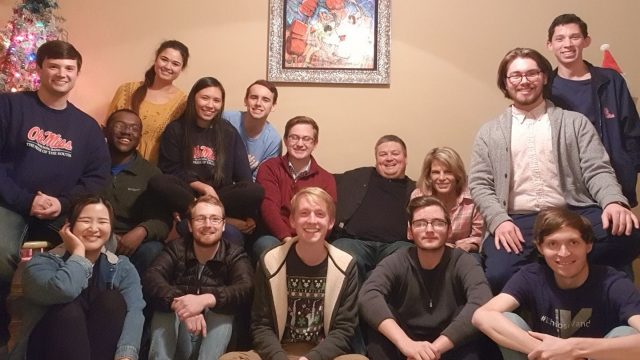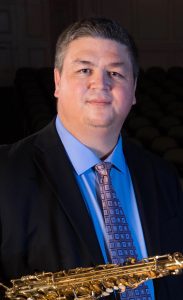
Adam Estes (back, right center) hosts a holiday dinner in 2019 for students in his saxophone studio. Submitted photo
OXFORD, Miss. – Music professor Adam Estes recently garnered two honors that he knows will do more than just add to his resume – they also will bring opportunities for his students.
Estes, an associate professor of music in saxophone and bassoon at the University of Mississippi, has been named a regional director of the North American Saxophone Alliance, known as NASA.
“This organization is the most scholarly, productive and active group of its kind in North America,” said Estes, who hosted the NASA regional conference for the Southeast U.S. last year at UM.
The professor also has been named a Légère Endorsing Artist by the Légère Reed Co.
“We select our endorsers from hundreds of applications received, and select artists who are at the top of their respected careers,” said Sean King, who manages the company’s endorsing artist program.
“Dr. Estes certainly demonstrates these attributes, as a tremendous performer on saxophones and woodwinds in general, over multiple styles and genres of playing, as well as being a renowned and respected pedagogue in woodwinds.”
While Estes is pleased and honored to have been recognized, he is most excited by the opportunities that these roles will bring to his students at UM.
His relationship with Légère, for example, will provide both his music performance students and his music education students with essential hands-on experience with a variety of reed types. The company will donate a range of woodwind reeds to Estes’s saxophone and bassoon students, and also to students in his Single Reeds Methods course.
The methods course helps music education students who don’t play a single-reed instrument become familiar with the instruments and learn the basics of playing them, so that they can teach students in a band or orchestra setting, for example.
“Our students need to know what reeds are on the market and they should play-test all of the products so that they can be as informed as possible, both for their own playing and so that they can properly advise students of their own when they enter the workforce,” Estes said.
Légère also will sponsor Estes as a clinician, allowing him to travel to conferences and workshops around the region and country to conduct master classes.

UM music professor Adam Estes has been named a regional director of the North American Saxophone Alliance. Photo by Kevin Bain/Ole Miss Digital Imaging Services
Estes said his work with NASA also will have layers of benefits for his students.
“Personally, I’ve been a member of NASA since 2000, dating back to when I was an undergraduate student,” he explained. “Through its conferences, NASA has provided me with numerous opportunities to perform, lecture, teach master classes and network in our field.
“By being involved in NASA, our saxophone students are provided with these same opportunities.”
Many of Estes’ students helped host the 2019 Region 6 NASA Conference at Ole Miss in March 2019. They helped with event planning, fundraising, logistical planning and execution of the two-day event, which attracted more than 300 participants from across the Southeast.
“As a teacher, I try to facilitate ways in getting our students off-campus to engage in meaningful experiences – through competitions, conferences, symposia, festivals and workshops,” he said. “It is imperative that our students understand that high-quality musicmaking and teaching happens beyond our campus, beyond Mississippi and beyond the United States.
“Being actively involved in organizations like NASA help make that apparent our students.”
Estes’s leadership in NASA and his role as an endorsing artist are just a few ways he contributes to the Department of Music, said Andrew Paney, associate professor of music and the department’s assistant chair.
“Students flourish under his direction, his excellent teaching and the ways he takes the initiative to make our department better, more welcoming and more musical,” Paney said.
Estes is also part of a campuswide faculty initiative to improve online instruction. As a member of the Keep Teaching Learning Community on Resilient Pedagogy, he is sharing with fellow faculty members strategies to make courses resilient to disruption, to build community, to implement anti-racist pedagogies and to continue striving to be inclusive and humanizing in their teaching.
“I came away from this training inspired by the brilliance and resourcefulness of our colleagues across campus, and with confidence and enthusiasm about adapting what we do in the music department,” he said.
“We have a wealth of knowledge and experience in our department, and each of us possesses different strengths. We can learn, improve and grow together throughout this process to better serve our students and the department.”